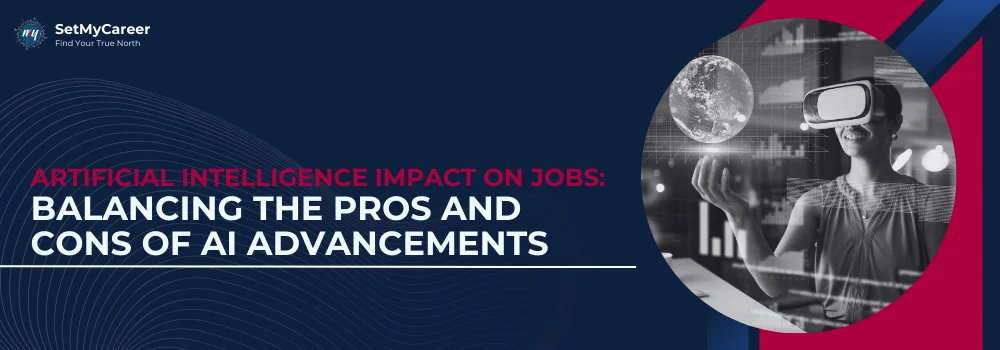Published by Jyothi Patil on 14 August 2024
Content Strategist | Editorial Team Member
Jyothi Patil is a skilled writer with a strong background in English literature, which she applies to crafting engaging content across various platforms. From writing blogs for her website and guest posts to creating pieces on Medium and Substack, Jyothi excels in making complex ideas easy to understand.
Delve into the effects of artificial intelligence impact on jobs, balancing its advantages and challenges. Discover how AI is transforming the workforce.

Picture a world where machines handle everything for us—seems like a dream, doesn't it? But as artificial intelligence (AI) becomes increasingly integrated into our lives, its impact on employment is a topic of growing concern. While AI offers remarkable benefits, such as increased efficiency and innovation, it also brings challenges that cannot be ignored. The question remains: Will AI replace our jobs, or will it create new opportunities? Let’s explore the advantages of ai and also the disadvantages and how it is reshaping the job market.
In this blog, we’ll dive into both sides of the AI debate, examining how AI might transform the workforce. We’ll discuss the potential risks, like job displacement and the widening skills gap, that come with rapid technological advancements. But it’s not all about the challenges; we’ll also explore the opportunities AI can create, from new job roles to enhanced productivity. While there are jobs that artificial intelligence cannot replace—such as those requiring empathy, creativity, and complex decision-making—many positions will be reshaped or redefined.
By the end, you’ll have a clearer understanding of the artificial intelligence impact on employment and the steps that can be taken to prepare for an AI-driven future. Whether AI helps us or causes problems depends on how we handle these changes right now.
Artificial Intelligence (AI) involves creating computer systems capable of performing tasks that usually need human intelligence. These tasks range from learning from past experiences to understanding language, identifying patterns, and making decisions. AI is not just one technology but a collection of technologies like machine learning, natural language processing, and robotics, all working together to simulate human abilities.
When it comes to jobs, AI has the potential to both create and disrupt roles. AI has the potential to take over routine, repetitive tasks, freeing people up to focus on more creative and strategic activities. For instance, AI can handle data entry, customer support, and even complex problem-solving faster and more efficiently than humans.
However, this also means that some jobs may become obsolete as AI systems improve. Roles that are highly repetitive or involve routine decision-making are most at risk. But it's not just about job loss—AI can also create new opportunities in fields like AI development, data analysis, and cybersecurity. The key is adapting to these changes by learning new skills and staying flexible in the evolving job market.

Learn how to adapt and thrive with AI by your side
Stay Future-Ready| Pros | Cons |
|---|---|
| Increased Efficiency and Productivity | Job Displacement and Losses |
| Cuts Costs | Widening Skills Gap |
| Enhanced Decision-Making | Privacy and Ethical Concern |
| New Job Creation | Over-Reliance on Technology |
| Innovation and Growth | Risk of Bias and Mistakes |
AI can handle tasks quickly and accurately, making work more efficient and freeing up time for more complex tasks. Imagine a machine tirelessly working around the clock, getting things done faster and with fewer mistakes.
By automating repetitive tasks, AI helps companies save money. With fewer resources spent on routine work, businesses can lower their costs and potentially pass those savings on to customers.
AI’s ability to analyze vast amounts of data means better, more informed decisions. Whether it's predicting trends or optimizing processes, AI helps businesses make smarter choices.
While AI might replace some jobs, it also opens up new opportunities in tech fields like AI development and data science. As AI grows, so does the need for skilled professionals to drive it forward.
AI is sparking new ideas and breakthroughs across industries. From creating new products to transforming business models, AI is a key player in today’s innovation landscape.
AI’s efficiency may cause job losses in routine roles, creating job security concerns. However, knowing how to be confident in an interview and developing relevant skills can help you adapt and stand out in the evolving job market.
As AI evolves, workers need new skills to stay relevant, creating a gap between available jobs and current skills. This highlights the importance of soft skills like communication and adaptability in maintaining competitiveness in an AI-driven world.
AI often relies on personal data, raising concerns about privacy. There’s also the risk of bias in AI decisions, which can lead to unfair outcomes, especially in sensitive areas like hiring or law enforcement.
As AI becomes more integral to business operations, there’s a risk of becoming too dependent on it. If AI systems fail, it could cause significant disruptions.
AI systems can only be as effective as the quality of the data they’re trained on. If the data is biased or flawed, AI can make mistakes or produce biased results, which can have serious consequences.
Artificial intelligence affect employment is a mix of both good and challenging changes. While AI can boost productivity and open up new career opportunities, it also brings risks to current jobs and requires us to keep learning new skills. As we move forward in this AI-driven world, staying informed and adaptable is key. SetMyCareer is here to support you in achieving your career goals. Reach out to our experts to learn how you can stay competitive in the changing job market.
No. 14/595, 1st Floor, Nanjappa Reddy Layout, Koramangala 8th Block, Bangalore 560095